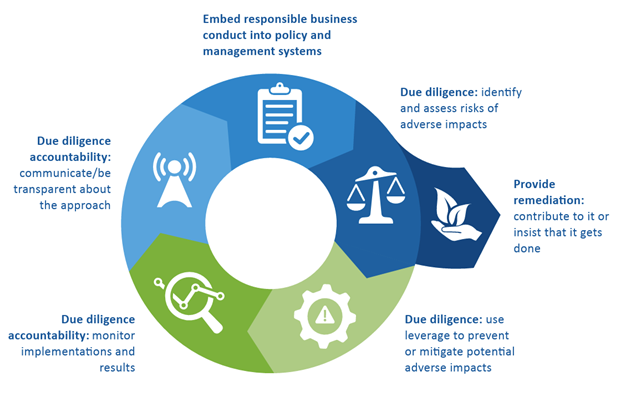Sustainability systems and due diligence
As corporate due diligence on human rights and environmental issues becomes mainstreamed and increasingly mandatory, credible sustainability standards should be part of the conversation on how to support this. ISEAL’s work on understanding and supporting corporate due diligence efforts covers a range of activities.
- We support ISEAL members strengthen their systems in areas that have direct relevance to company due diligence efforts such as traceability, assurance, data management and remediation.
- We provide grants through the ISEAL Innovation Fund to help sustainability systems (and their partners) pilot tools and approaches to support implementation of effective, fair, and impactful due diligence.
- We track, analyse and influence relevant voluntary and mandatory policy frameworks on corporate due diligence to advocate for the role of sustainability systems as credible partners.
Learn about how ISEAL members are piloting new approaches to support due diligence.
The term “due diligence” has different meanings depending on the context in which it is used. For businesses, it is seen as a process to identify, manage and minimise business risks. International law understands due diligence in a slightly different way: as a duty or obligation to take reasonable steps to avoid harm to others – an expected duty of care. Here, due diligence refers to the reasonable steps a person or organisation should take to avoid committing an offence. Where a firm directly causes or contributes to an adverse impact it should stop generating such an impact and offer remediation for the harm caused.
Regardless of the starting point, the main purpose of due diligence is to reduce and manage the negative impacts caused by a company’s activities to society and the planet. In its most holistic form, it involves bundles of interrelated iterative processes, many of which must involve proactive business behaviour including investment into strengthening the enabling business environment.
Due diligence matters because business activities can end up causing harm to people and the environment and it is important that companies take accountability to prevent and mitigate such harms. Seen another way, effective due diligence can bring to light systemic and structural challenges in supply chains that cause adverse impacts and trigger dialogue and partnerships to find solutions.
Most due diligence frameworks requiring a stepwise, sequential approach to identifying, assessing and managing social and environmental risks – often known as the due diligence cycle. Steps include:
- Embedding responsible business conduct into company policies and management systems. These systems must clearly allocate responsibilities and include customised written compliance procedures.
- Conducting risk assessments through investigations and supplier assessments and constantly monitor their operations, business relationships and supply chains.
- Taking immediate action when risks are identified in order to cease, prevent or mitigate adverse impacts and to have the necessary remediation protocols in place.
- Keeping track of their due diligence efforts and how they implement/improve their internal due diligence system.
- Communicating and informing the public about their due diligence efforts.

Sustainability systems are being used to support the development of responsible supply chains in a range of sectors. Through multistakeholder processes, sustainability systems define what responsible production and business conduct look like in a specific sector and translate this vision into principles, measurables criteria or practices through their standards and codes. Companies and producers around the world then implement these standards and their efforts are verified through assurance processes.
Sustainability systems can support company due diligence at various stages of the diligence cycle. They are set up to help supply chain actors gather data and insight about their product origins and provenance and supply chain data and risks. Often, they are designed to progressively mitigate supply chain risks through improvement pathways they have included in their system or through specific investments they facilitate or require of supply chain partners. Further, compliance with such a scheme and its standards could offer additional proof or evidence of meeting certain due diligence requirements (such as legality of production) or taking actions in relation to due diligence (such as risk identification).
Beyond specific tools and processes, such systems often go beyond the do-no-harm concept of due diligence and exceed minimum legal requirements in their framework for sustainability. This deeper and broader impact has an important risk mitigation effect, which in turn improves the effectiveness of due diligence legislation – especially as many social and environmental risks are interconnected.
Companies have actively used such systems as a key component of their voluntary due diligence efforts for years. Now with the rise of mandatory due diligence, both companies and schemes need to get clearer about where and how they partner to meet legal requirements. Credible systems can and should still be a part of the business toolbox but ensure that they don’t serve as a green lane or replace a company’s own accountability and compliance mechanisms.
Sustainability systems that implement credible practice can provide important tools to help companies with due diligence efforts. They often focus on systemic impacts that can help companies take a long-term view to sustainability and identify and mitigate long-term risks. They facilitate stakeholder engagement and dialogue – at a sector, industry or supply chain level – that builds trust, transparency and helps share knowledge. They have in place many individual tools or elements that support companies with the practicalities of due diligence requirements. This could be data collection, verification and traceability systems that underpin most stages of the due diligence cycle. It could also extend to specific risk identification, mitigation and remediation services offered to some clients.
The extent to which such systems they can be complete solutions to meet company needs largely depends on the design of the system and its practical implementation. Now with the rise of mandatory due diligence, both companies and schemes need to get clearer about where and how they partner to meet legal requirements. Credible systems can and should still be a part of the business toolbox but ensure that they don’t serve as a green lane or replace a company’s own accountability and compliance mechanisms.
Traceability and chain of custody
- Coverage of social and environmental risks: The issues that a sustainability system covers depend on the focus of the system. Some systems cover a broad range of sustainability issues within a specific sector, while others focus on specific challenges linked to their operating environment. Clearly, the more issues (of relevance) a scheme covers, the more useful it is as a due diligence support tool. Similarly, the deeper the requirements of a scheme go on a particularly thorny issue such as forced labour or gender equality, the more useful the system is for companies.
- Traceability: The ability to trace a product’s supply chain and origin, is a key system requirement for companies to undertake due diligence. Sustainability systems offer varying levels of supply chain traceability and related data and insight that companies can take advantage of to support with due diligence.
Data management
- Data collection and management: With emerging legislation and reporting and disclosure requirements, companies are being asked to report specific sets of information and sustainability systems will increasingly be a tool to help them communicate that information.
Assurance
- Assurance and verification: A sustainability system that has a strong assurance mechanism is more trustworthy, and thus more useful as a due diligence tool. Companies that work with such schemes can have an added level of confidence in certified products or the relevant sections of their supply chains better meeting due diligence requirements. Schemes can also offer their business clients additional assurance and verification services as part of their due diligence offerings.
- Collaborative solutions towards risk mitigation: By taking a holistic lens to sustainability issues and impacts, sustainability systems can help drive meaningful risk mitigation efforts through stakeholder dialogue and collaboration. This can take many forms from introducing shared responsibility goals into their standard or setting scheme membership requirements and codes of conduct to influence the actions of companies beyond just producing and buying certified products.
Learn about ISEAL Innovation Fund projects where schemes are piloting collaborative solutions to risk identification and mitigation.
- Supporting grievance redressal and remediation: All credible sustainability systems must have a grievance or complaints mechanism. Such tools can be powerful ways to help rightholders raise grievances in a safe and neutral space without fear of retaliation from companies or the difficult of navigating courts. Schemes can play a range of roles in supporting procedural and substantive remedy such as through referrals, as information providers, facilitators of dialogue and potentially even remedy providers.






